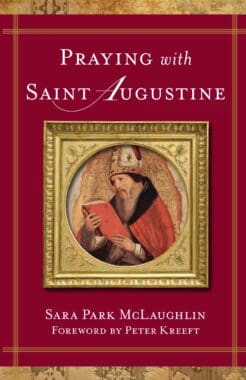Aurelius Augustinus, who is considered by most to be the greatest Father of the Church, was born on November 13, 354 A.D., in Numidia at Tagaste. The product of a classical education, Augustine spent many formative years espousing the truth of Manichaeism and Neoplatonism as he taught rhetoric in Milan. But in 387, he was baptized by St. Ambrose upon his conversion to Christianity, and in 391, he became a priest.
St. Augustine, who became Bishop of Hippo in 396, is probably most well known for his Confessions, the dramatic account of his own conversion, but the prolific writer also left behind more than a hundred works of all kinds, including theological treatises, exegetical writings, sermons, and letters.
St. Augustine’s Theology of Prayer
St. Augustine clearly perceived the reciprocal relationship between prayer and faith. He once preached that faith was the “fountain of prayer. .. . So then that we may pray, let us believe; and that this same faith whereby we pray fail not, let us pray. Faith pours out prayer, and the pouring out of prayer obtains the strengthening of faith” (Sermon 65 on the New Testament, no. 1).
He also believed that prayer sparks our desire for God’s answer and readies us to receive His gifts. Recognizing our total dependency on God for all things, even life itself, the saint reminded his listeners in a sermon that “however much you have, no matter how rich you are, you are a beggar of God. This is revealed at the hour of your prayer, and I prove it to you. … For do you not say: ‘Give us our daily bread?’ ” He followed this reminder with an exhortation to give to God what He has given us: “And yet Christ says to you: Give to me from that which I have given to you. For what did you bring when you came here? All the things that you, who were created, have found, I created: you have brought nothing here, and you will take nothing away” (Sermon 123, no. 5).
The most comprehensive explanation of St. Augustine’s views on prayer are in a letter written to a woman named Proba, a wealthy widow who had asked Augustine what kind of person she should strive to be in order to pray and what things to ask for in prayer. St. Augustine wrote an eloquent discourse on prayer in answer to her questions.
He first writes that we are all pilgrims walking in darkness, and as such, Christian souls on earth ought to feel desolate. Until we attain the true consolation awaiting us in Heaven, we must continue in prayer, walking by faith and not by sight. He warns her against finding false consolation in riches, because they will not last.
Then he addresses the question of how we should pray. Evidently, Proba had been disturbed by the Scripture, “We know not what we should pray for as we ought” (Rom. 8:26). St. Augustine replies that we should pray for a happy or blessed life, because that desire leads us to the Lord, “who is Himself the True Blessed Life” (Letter 130, no. 15).
St. Augustine reminds Proba, and us, that the Lord taught us three valuable lessons about prayer: God “knows what things we have need of before we ask Him,” “Men ought always to pray and not to faint,” and “Ask, and you shall receive; seek and you shall find; knock, and it shall be opened unto you” (Letter 130, nos. 15–16).
He explains that prayer is not for God’s benefit but for ours. It increases our desire and makes us ready to receive His gifts. Furthermore, “when we cherish uninterrupted desire along with the exercise of faith and hope and charity, we ‘pray always’ ” (Letter 130, no. 18). In other words, St. Augustine interprets the Biblical admonition to “pray without ceasing” as “desire without intermission, from Him who alone can give it, a happy life, which no life can be but that which is eternal” (Letter 130, no. 18). He continues:
To us, therefore, words are necessary, that by them we may be assisted in considering and observing what we ask, not as means by which we expect that God is to be either informed or moved to compliance. When, therefore, we say, “Hallowed be Thy Name,” we admonish ourselves to desire that His name, which is always holy, may be also among men esteemed holy, that is to say, not despised; which is an advantage not to God but to men.
When we say, “Thy Kingdom come,” which shall certainly come whether we wish it or not, we do by these words stir up our own desires for that Kingdom, that it may come to us and that we may be found worthy to reign in it.
When we say, “Thy will be done on earth as it is in Heaven,” we pray for ourselves that He would give us the grace of obedience, that His will may be done by us in the same way as it is done in heavenly places by angels. When we say, “Give us this day our daily bread,” the words “this day” signify for the present time, in which we ask either for that competency of temporal blessings that I have spoken of before (“bread” being used to designate the whole of those blessings, because of its constituting so important a part of them), or the sacrament of believers, which is in this present time necessary, but necessary in order to obtain the felicity not of the present time but of eternity.
When we say, “Forgive us our debts as we forgive our debtors,” we remind ourselves both what we should ask and what we should do in order that we may be worthy to receive what we ask. When we say, “Lead us not into temptation,” we admonish ourselves to seek that we may not, through being deprived of God’s help, be either ensnared to consent or compelled to yield to temptation.
When we say, “Deliver us from evil,” we admonish ourselves to consider that we are not yet enjoying that good estate in which we shall experience no evil. …
If we pray rightly, and as becomes our wants, we say nothing but what is already contained in the Lord’s Prayer. (Letter 130, nos. 21–22)
The letter continues with an insight into the saint’s prescription for effective prayer:
Faith, hope, and charity, therefore, lead unto God the man who prays, i.e., who believes, hopes, and desires and is guided as to what he should ask from the Lord by studying The Lord’s Prayer. Fasting and abstinence from gratifying carnal desires in other pleasures, without injury to health, and especially frequent almsgiving are a great assistance in prayer; so that we may be able to say, “In the day of my trouble I sought the Lord, with my hands in the night before Him, and I was not deceived.” For how can God, who is a Spirit, and who cannot be touched, be sought with hands in any other sense than by good works? (Letter 130, no. 24)
We should keep these words in mind as we read St. Augustine’s prayers.
+
This article is adapted from the introduction of Praying with St. Augustine by Sara Park McLaughlin which is available from Sophia Institute Press.
Art for this post on St. Augustine and prayer: Cover image used with permission; Saint Augustine, Philippe de Champaigne, between circa 1645 and circa 1650, PD-US author’s life plus 100 years or less, Wikimedia Commons.





